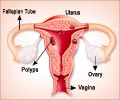A genetic mutation that had been overlooked in recent large, comprehensive gene searches is implicated in about 20 percent of colorectal and endometrial cancers.

Reporting in the October 26, 2014 edition of Nature Genetics, investigators from Dana-Farber Cancer Institute and the Broad Institute of MIT and Harvard said the mutated gene helps control an important cell-signaling pathway, Wnt, that has been implicated in many forms of cancer. They suggest that the RNF43 mutation may serve as a biomarker that identifies patients with colorectal and endometrial cancer who could benefit from precision cancer drugs that target the Wnt pathway, although no such drugs are currently available.
"Tumors that have this mutation may be telling us that they are dependent on the Wnt signaling pathway, and they will be uniquely sensitive to drugs that inhibit this pathway," said Charles Fuchs, MD, MPH, an author of the paper and director of the Center for Gastrointestinal Cancer at Dana-Farber. He is also affiliated with Brigham and Women's Hospital and the Harvard School of Public Health.
In animal models of cancer, tumors that harbor RNF43 mutations have been found to be sensitive to new Wnt pathway inhibitors that are now in clinical trials in humans, according to Marios Giannakis, MD, PhD, who is affiliated with Dana-Farber and is also a postdoctoral researcher at the Broad Institute.
The researchers were surprised to find RNF43 mutations in such a significant proportion of colorectal and endometrial cancers because they had not been detected in recent comprehensive searches of tumor DNA conducted by scientists of The Cancer Genome Atlas (TGCA) project.
Authors of the new study believe computer algorithms used by TCGA to parse data from DNA sequencing of tumors may have interpreted the "signal" of the RNF45 mutation as an artifact, and discarded it, much as a legitimate email will sometimes be trapped in a junk filter.
Advertisement
Other frequently mutated genes in colorectal cancer include APC (73 percent), P53 (50 percent), and KRAS (40 percent).
Advertisement
For the new study, 185 colorectal cancer specimens from this collection were analyzed by whole-exome DNA sequencing at the Broad Institute under the leadership of Levi Garraway, MD, PhD, who is affiliated with Dana-Farber, the Broad, and Brigham and Women's Hospital, and is corresponding author of the report. The RNF43 mutation was identified in 18.9 percent of the colorectal tumors.
This surprising result prompted the investigators to re-analyze 222 colorectal cancer samples from TCGA project and found the RNF43 mutation in 17.6 percent. The researchers, noting that endometrial cancer is dependent on abnormal Wnt signaling, then re-analyzed 248 DNA samples from endometrial cancer that had been previously analyzed by TCGA scientist. They found a strikingly similar proportion – 18.1 percent – of RNF43 mutations in those cancers. The scientists predict they will find the mutation in stomach cancers as well, which also are driven by abnormal Wnt signaling.
The study authors noted that the discovery of such a significant cancer mutation that hadn't been picked up in the previous gene hunts shows that carrying out these comprehensive genomic searches continues to have value.
Source-Eurekalert












